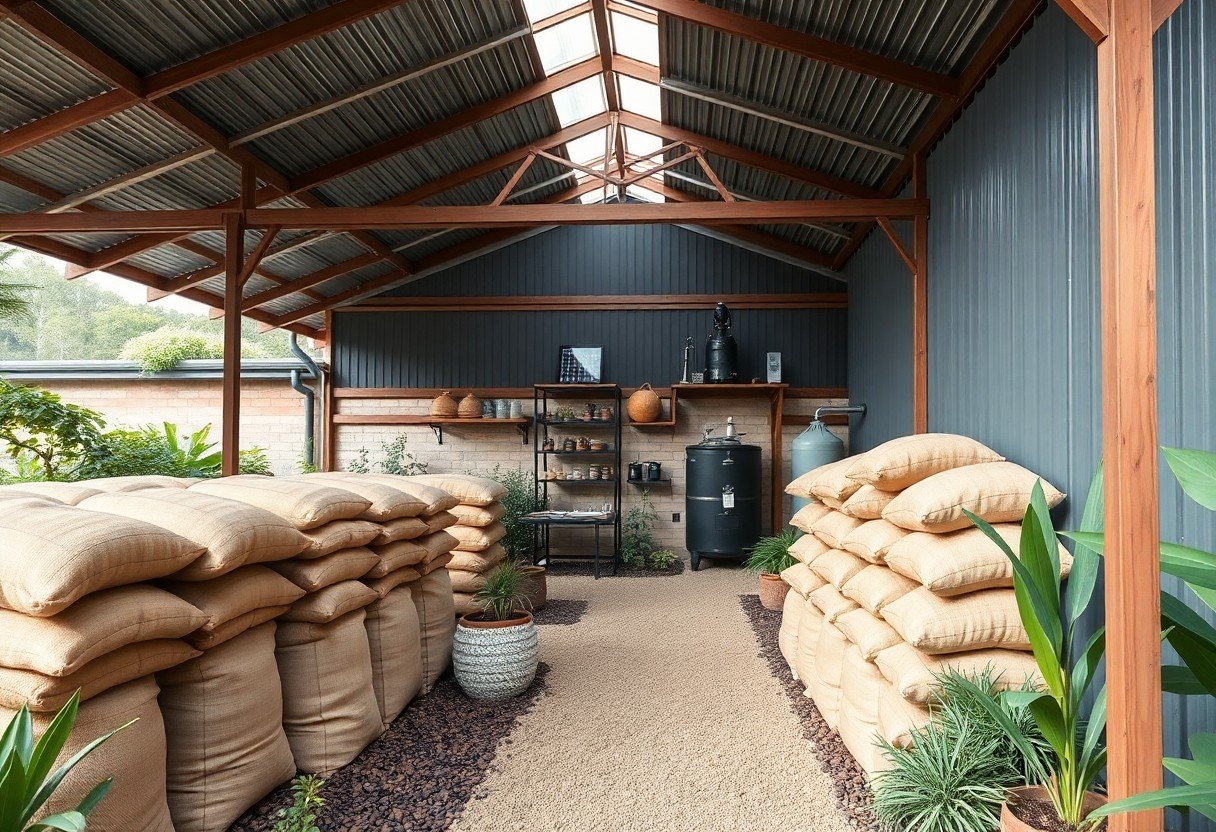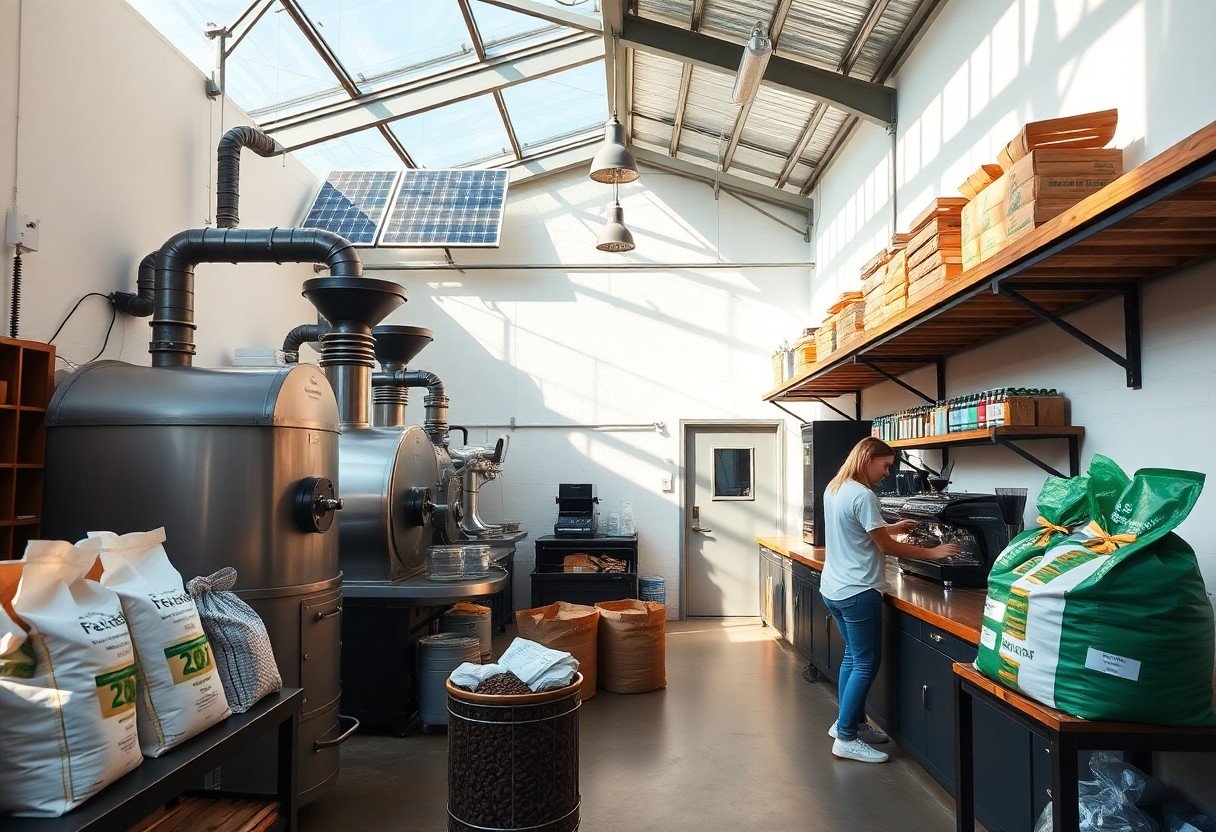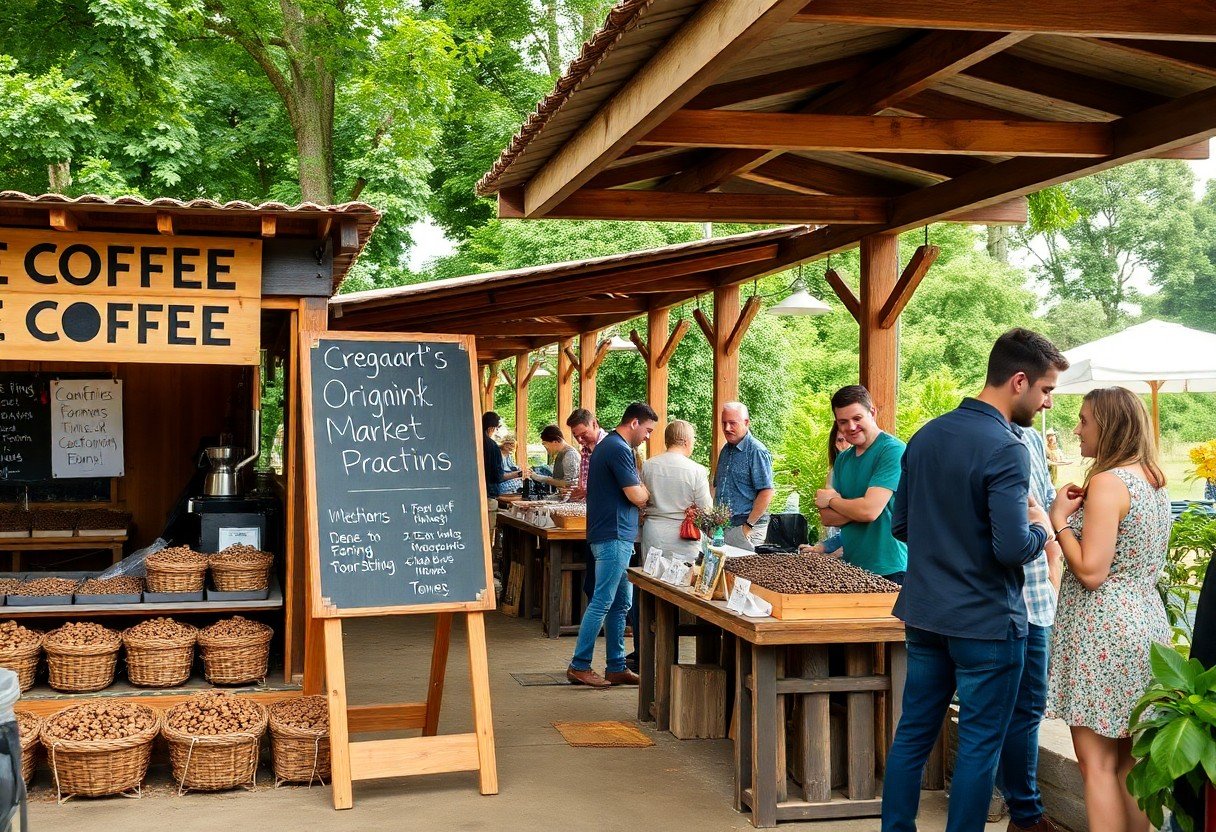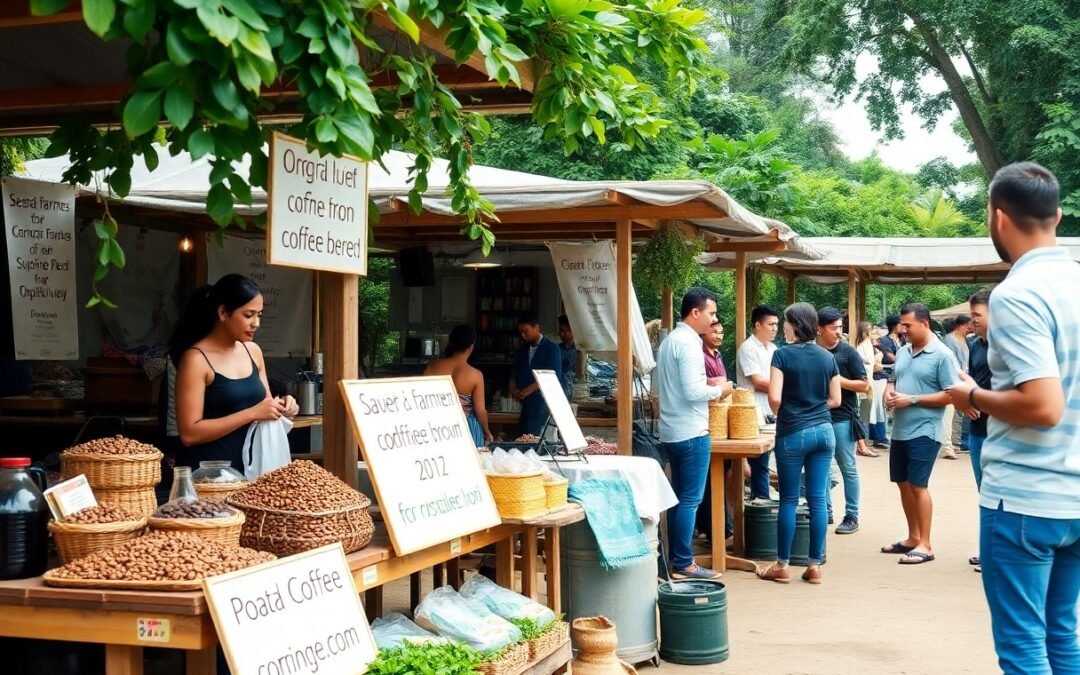Many coffee enthusiasts are looking to contribute to eco-friendly practices within the coffee industry. You can enhance sustainability by choosing to support Australian coffee roasteries that prioritize ethical sourcing, energy-efficient roasting methods, and waste reduction. By educating yourself about sustainable practices, engaging with local roasters, and sharing resources, such as Roasting Sustainably: Dear Green’s Vision For A Climate-…, you can play an active role in promoting a more sustainable coffee culture.

The Impact of Coffee Production on the Australian Ecosystem
Examining Coffee’s Carbon Footprint
Your daily cup of coffee carries an environmental impact that extends far beyond the brewing process. Coffee production, from cultivation to transportation, generates substantial carbon emissions. In fact, it’s estimated that the entire supply chain for coffee contributes approximately 3.2 billion kilograms of CO2 annually to the atmosphere. This figure encapsulates activities such as land clearing for coffee plantations, the use of fossil fuels in machinery, and the transportation of coffee across the globe. By supporting local Australian roasteries that source beans from sustainable farms, you reduce these emissions related to transportation and encourage closer, more sustainable cultivation practices.
The Role of Biodiversity in Sustainable Coffee Farming
Your choice of coffee directly influences biodiversity within ecosystems, especially in Australia’s unique agricultural landscapes. Sustainable coffee farming practices, such as shade-grown coffee, incorporate a variety of plant species into the coffee-growing process. This method not only supports the native flora and fauna but also provides a healthier microclimate for coffee plants, reducing the need for chemical fertilizers and pesticides. A study showed that diverse agroforestry systems can enhance coffee yields by as much as 30% while promoting ecological stability. By opting for coffee from biodiversity-friendly farms, you help sustain these multifaceted ecosystems.
Sustainable Sourcing: Building Relationships with Ethical Suppliers
Identifying Certified Sustainable Coffee Brands
To champion sustainable sourcing, start by identifying coffee brands with recognized certifications such as Fair Trade, Rainforest Alliance, or Certified Organic. These certifications ensure that coffee is produced under guidelines that advocate for fair wages, environmental stewardship, and community development. Seek out roasters who display these certifications prominently, demonstrating their commitment to ethical practices. Engaging with brands that have established and transparent supply chains will not only satisfy your sustainability goals but also communicate those values to your customers.
Researching the history and impact of these certifications can deepen your understanding of each brand’s commitment. For instance, Fair Trade prices guarantee a minimum income for farmers, fostering economic stability in coffee-growing regions. It’s beneficial to source not only from certified brands but also from those that have strong, traceable ties to the communities where the coffee is grown. This ensures your sourcing choices support sustainable farming practices and empower smallholder farmers.
Engaging with Local Farmers and Cooperatives
Building direct relationships with local farmers and cooperatives allows you to source coffee that aligns with sustainable practices while also supporting local economies. This engagement can take the form of farm visits, direct trade agreements, or collaboration on sustainability initiatives. By establishing a rapport with these producers, you gain insight into their farming methods and challenges, enabling you to make informed decisions about the coffee you select for your roastery. Furthermore, investing directly in the livelihoods of these farmers can create a more resilient supply chain and foster community growth.
Inviting farmers to participate in cupping sessions or incorporating their stories into your marketing can enhance your brand’s authenticity. Additionally, consider developing partnerships that enable knowledge sharing, training in sustainable agricultural methods, or even funding educational programs to support farmers’ families. Such initiatives reinforce your commitment to sustainability and create meaningful connections that underscore the importance of the local coffee ecosystem.

Transforming Roasting Techniques for Environmental Efficiency
Innovations in Energy Use During Roasting
Adopting innovative approaches to energy use during the coffee roasting process significantly contributes to sustainability. Many roasteries are now utilizing energy-efficient machines that incorporate advanced technology, such as infrared and hot air roasting systems. These methods not only enhance flavor profiles but also reduce energy consumption by up to 30% compared to traditional drum roasters. By selecting equipment designed for lower thermal loss and optimal heat distribution, you can improve your overall roasting efficiency, leading to notable reductions in operational costs and carbon footprint.
Additionally, integrating renewable energy sources into your roasting operations can further amplify your commitment to sustainability. Utilizing solar panels or wind energy to power roasting equipment aligns with a holistic approach to environmental stewardship. According to industry studies, roasteries that have shifted to renewable energy report a significant decrease in greenhouse gas emissions, setting a positive precedent within the coffee community. You can explore partnerships with local energy providers to ensure your roasting process is as green as possible.
Minimizing Waste through Smart Roasting Practices
Waste minimization strategies can transform your coffee roasting operations into a model of sustainability. One effective method is implementing real-time monitoring systems that track beans’ temperature and moisture levels, allowing for precise control over roasting times and reducing over-roasting incidents. Over-roasting can lead to excessive chaff and carbon waste, while precise control helps maintain bean quality with less by-product. You might also consider focusing on batch sizes that align with demand, eliminating the need for excess production that often ends up wasted.
Investing in a comprehensive waste management system allows you to utilize by-products creatively. For instance, coffee grounds can be composted or transformed into biofuels, effectively closing the loop on waste within your operations. Collaborating with local farms or composting services further enhances your sustainability efforts. By integrating these practices, you not only reduce waste but also contribute positively to your local ecosystem, showcasing the potential for a fully circular economy in coffee roasting.
The Art of Responsible Packaging for Coffee Products
Selecting Eco-Friendly Materials
Choosing sustainable packaging materials is vital in reducing the environmental impact of coffee products. Materials like compostable bioplastics, recycled paper, and biodegradable films can significantly lower your carbon footprint. Many brands are increasingly opting for these options, recognizing that consumers are willing to support environmentally conscious practices. For instance, using bags crafted from cornstarch-based bioplastics not only decreases waste but also offers a similar barrier performance to traditional plastics, preserving freshness while being easier on the planet.
Additionally, you can explore options such as reusable and refillable containers. Encouraging customers to return their packaging for refills creates a bond between your brand and its community, fostering loyalty while promoting sustainable habits. Brands that implement such systems often find that their customers appreciate the opportunity to participate directly in eco-friendly initiatives, making them feel part of a larger movement toward sustainability.
Implementing a Circular Economy Approach
A circular economy approach effectively minimizes waste by keeping products and materials in circulation. By designing packaging that can be reused or repurposed, you can create a sustainable loop where items continually serve a purpose rather than ending up in landfills. For example, consider collaborating with local organizations to establish recycling programs that encourage your customers to return used packaging for processing and upcycling. This not only reduces waste but also strengthens community ties.
Your coffee roastery can benefit from this methodology by analyzing the entire product lifecycle and adopting strategies that prioritize sustainability at every phase. Implementing a system that tracks packaging disposal and reuse offers insights that allow for continuous improvement. Engaging consumers through education about the impact of their choices can enhance their commitment to supporting a circular economy, fostering a culture of sustainability that extends beyond your business.

Building a Community Around Sustainable Coffee Practices
Educating Consumers on Sustainability Choices
Engaging your customers in sustainability dialogues can significantly influence their purchasing decisions. You can organize workshops that highlight the journey of coffee from farm to cup, showcasing the environmental impact of various sourcing and production methods. Offering tastings of sustainably sourced coffee alongside educational materials will empower your consumers to make informed choices. The more they understand the implications of their consumption, the more invested they become in supporting sustainable practices.
Utilizing social media platforms to disseminate information on sustainable coffee practices further strengthens your community ties. Share success stories of sustainable farmers and the positive impacts of your sourcing decisions. You might consider creating infographics or short videos that illustrate key points, making the information more digestible and engaging for your audience.
Collaborating with Other Local Businesses
Partnering with local businesses can amplify your sustainability efforts and create a united front for environmentally conscious practices. Hosting joint events with bakeries, restaurants, or local markets not only fosters a sense of community, but also broadens the audience for sustainable coffee. These partnerships can lead to mutually beneficial promotions, where each business supports the other’s commitment to sustainability.
By coordinating pop-up events or farmer’s market booths, you can create a shared space for customers to explore sustainable options. These collaborations can also introduce your audience to a wider range of sustainable products, helping them to see the full cycle of ethical consumption. You may also invite guest speakers from local environmental organizations to offer insights on the importance of local sustainability efforts, further enhancing your community appeal.
Collaborating with other local businesses extends beyond events; consider creating a collective loyalty program that encourages customers to shop sustainably across all participants. By integrating efforts with local farmers, artisanal makers, or eco-friendly retailers, you build a network of support that strengthens your sustainability message while providing customers with a unified shopping experience. These initiatives not only drive traffic but also cultivate a reputation for community involvement and a commitment to sustainability, enhancing your brand’s overall identity.
Final Words
Summing up, supporting sustainable Australia coffee roastery practices requires a commitment to sourcing ethically produced beans and engaging with local suppliers who prioritize environmental responsibility. You can make an impact by choosing to buy from roasteries that implement sustainable processes, such as energy-efficient roasting and waste reduction techniques. Your purchasing choices play a significant role in promoting practices that benefit the environment and support community livelihoods.
Moreover, your involvement extends beyond purchasing. You can advocate for sustainable practices in your community by sharing knowledge about the benefits of supporting ethically sourced coffee. Engaging with coffee roasteries, attending workshops, and participating in local sustainability initiatives will amplify your impact and encourage others to prioritize environmentally conscious choices. By being an informed consumer and advocate, you contribute to a more sustainable coffee industry in Australia.
FAQ
Q: What are sustainable coffee sourcing practices?
A: Sustainable coffee sourcing practices involve selecting coffee beans from farms that prioritize environmental health, social equity, and economic viability. This includes using organic farming methods, ensuring fair labor practices, and supporting farmer cooperatives.
Q: How can I identify sustainable coffee roasteries in Australia?
A: Look for certifications such as Fair Trade, Rainforest Alliance, or Organic on coffee products. Research roasteries that highlight their sourcing practices and commitments to environmental and social responsibility on their websites or packaging.
Q: What role does shade-grown coffee play in sustainability?
A: Shade-grown coffee is cultivated under tree canopies, which helps preserve biodiversity, provides habitat for wildlife, and reduces soil erosion. This method improves the ecosystem and can lead to higher quality coffee beans.
Q: How does water usage impact coffee sustainability?
A: Water usage in coffee production can lead to depletion of local water sources and pollution from runoff. Sustainable practices encourage efficient water management, recycling, and treatment to minimize environmental impact and conserve resources.
Q: What are the benefits of supporting local coffee roasteries?
A: Supporting local coffee roasteries helps boost the local economy, reduces carbon footprint due to less transportation, and often ensures fresher coffee. Many local roasteries are committed to sustainable practices, enhancing their positive impact on communities and the environment.

